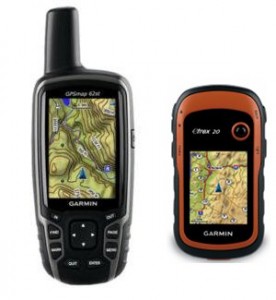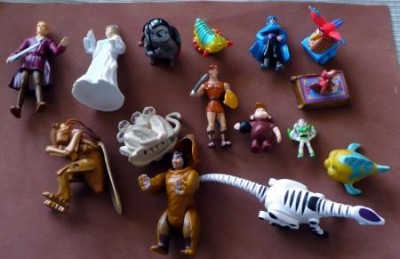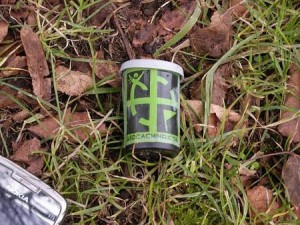With spring looming, a new season of geocaching is nearly upon us. With it comes an influx of new people to the hobby. Regular geocachers will be familiar with the concept of a geocaching kit bag but for the benefit of those just starting out, this month we’re going to go over the basic items you need to geocache efficiently and safely.
GPSr
This is probably most important item on the list. Unless you are new to GPSTracklog, I suspect that you already know what a GPS receiver is. But for those who don’t, here’s the briefest of rundowns. To geocache you’ll need the ability to get a GPS reading of your location. This can typically be done in one of two ways: via a modern smartphone or via a dedicated unit.
 Whilst it would be technically possible to geocache with the type of GPS receiver you might use in your car, there are a number of handheld units specifically designed for the outdoors enthusiast. They’re robust, they’re waterproof, have good battery life and most have dedicated geocaching features. You’re probably looking at paying anywhere from a couple of hundred to six hundred dollars for a decent unit. Asking which is the best GPS receiver to buy is going to illicit a number of different replies depending on who you ask, and this site is a treasure trove of information on the different units and what they can do.
Whilst it would be technically possible to geocache with the type of GPS receiver you might use in your car, there are a number of handheld units specifically designed for the outdoors enthusiast. They’re robust, they’re waterproof, have good battery life and most have dedicated geocaching features. You’re probably looking at paying anywhere from a couple of hundred to six hundred dollars for a decent unit. Asking which is the best GPS receiver to buy is going to illicit a number of different replies depending on who you ask, and this site is a treasure trove of information on the different units and what they can do.
If a dedicated GPS receiver is outside your budget then providing your smartphone or tablet has a GPS feature you can download an app. There are a few available but the one you want is the official Geocaching.com app from Groundspeak. It’s available for iOS, Android and Windows phones. It’s a little pricey, coming in around $10, although Groundspeak do offer a stripped down Geocaching Intro app for free if you just want to try out the hobby.
The reason you want the official app is because, whilst there are a number of listing sites available, Geocaching.com is the main and largest one. You may encounter some geocachers who try and convince you one of the other listing sites is more superior. They may ultimately suit your needs better, but to get a feel for the hobby, start with the official one.
Geocaching.com account
Now you have your smartphone enabled with the app or dedicated GPSr, it’s time to set up your account. You can either do this via the app or via the Geocaching.com website. You’ll be asked to choose a username. This will what people will refer to as your caching name. It’s the name other geocachers will know you by and what you will sign geocache logs with. For this reason, spend some time and come up with a decent name that’s family friendly, and remember with millions of registered users, it’s very likely that your first choice will already be taken.
You’ll need the account so that you can log your finds. If you eventually become a premium member, logging in will be the only way to access the premium features.
Pen
NEVER leave home without a pen. This cannot be stressed enough. In fact, always carry a spare as well. In order to claim a find you have to sign the paper log in the cache. Except in the rarest of circumstances, cache owners take a very dim view of geocachers who do not sign logs, especially when the excuse is a forgotten pen (Note: I and other geocachers have hastily fashioned quills and ink out of sticks and mud in order to sign logs when pens have been lost on the trail or broken). Geocaching often means signing a piece of paper that’s been damp for years and is falling apart. Some ballpoints don’t work well on damp paper.
Personally, I’ve found gel-based pens and sharpies best (although sharpies can be a little thick, especially on logs for the smallest nano size of geocaches).
Good Footwear
Geocaching often involves scrambling through undergrowth, climbing up banks and navigating hazardous terrain. It’s therefore a good idea to invest in some decent footwear. You don’t necessarily need to go all out and buy top of the range hiking boots unless you plan to hit some serious trails, but a good approach shoe should be light enough to not feel heavy on your feet whilst giving you that all-important grip.
Old Clothes
There are plenty of stories of geocachers who’ve popped out at lunchtime to do a geocache dressed in their business suit, only to slip in some mud and return to the office looking like something that climbed out of a swamp. You are going to get messy geocaching. You’ll also find yourself fighting through the odd bit of undergrowth. It’s surprising how quick you get accustom to rushing into areas you previously had no intention of going anywhere near.
But clothes can snag on briars and thorns, geocaches can be in muddy or wet locations, and for that reason it’s probably not the greatest idea to wear your Sunday best clothes when geocaching.
First Aid Kit
I used to say that if I went out geocaching for the day and didn’t end up with a stick in the eye, it wasn’t a good day. That might be a slight exaggeration, and I don’t want it to sound that it’s impossible to geocache without injuring yourself, but you’ll get the occasional cut or scrape.
For that reason, a basic First Aid kit is sensible, even if it’s just a couple of surgical wipes and a few band aids.
Swaps
 The golden rule is that if you take an item from a geocache you replace it with something of equal or greater value. Not everyone bothers with swaps, instead just worrying about trackables and signing logs. But if you think you might want to take something from a geocache, especially if you have small children with you, it would be advisable to get a small toiletry bag and fill it with knickknacks and small toys you can use as swaps.
The golden rule is that if you take an item from a geocache you replace it with something of equal or greater value. Not everyone bothers with swaps, instead just worrying about trackables and signing logs. But if you think you might want to take something from a geocache, especially if you have small children with you, it would be advisable to get a small toiletry bag and fill it with knickknacks and small toys you can use as swaps.
Remember, your swaps should consist of nothing that would be offensive or dangerous to a small child, and nothing perishable either (food or candy will just rot and attract wildlife resulting in the geocache being damaged).
Rucksack
I have a dedicated rucksack that I use for geocaching and take with me whenever I go. Like my clothes, that way if it gets damaged or muddy, it’s not a big deal. You don’t even need one that’s particularly expensive. I just used an old one I had laying around the house.
If you don’t have a dedicated rucksack, it’s advisable to keep all your geocaching equipment together so that you’re not turning the house upside down the night before a trip.
Torch
If you are away from urban areas you’ll find that places can get very dark very quickly. On top of that, trails aren’t hazard free. It can be difficult to plan how long a set of geocaches are going to take you, so even if you think you’ll be finished long before the sun sets, having a small torch with you can literally be a lifesaver. Likewise, whilst you can’t always be guaranteed cell reception, so a mobile cell phone is a must on the grounds of safety.
Other Items?
As you geocache more and more, you’ll find your kit will increase. If you’re a regular geocacher. what other items do you have in your kit bag? Which bits would you recommend for someone just starting out? Let us know in the comments below.

